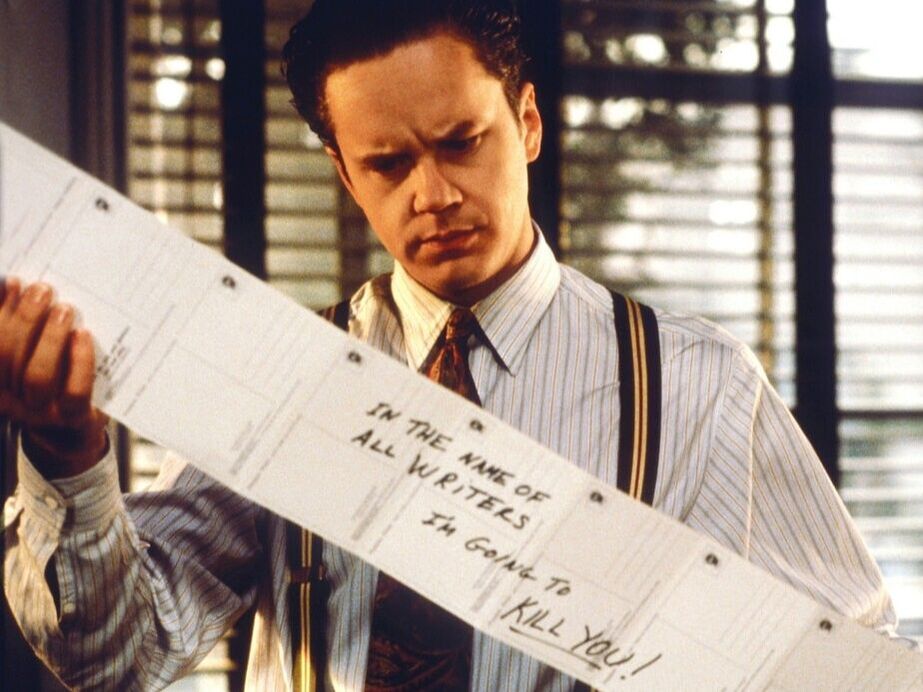|
A Hollywood studio executive receives death
threats from a writer whose script he rejected. COMEDY
|
The Player (1992)Directed by Robert Altman
Written by Michael Tolkin Starring Tim Robbins, Greta Scacchi, Fred Ward, Whoopi Goldberg, Peter Gallagher, Brion James, Cynthia Stevenson, Vincent D'Onofrio, Dean Stockwell, Richard E. Grant, Sydney Pollack Based on the novel by Michael Tolkin Oscar Nominations - Best Director, Best Adapted Screenplay, Best Film Editing |
I love scathing satires, and I love films about filmmaking. Combine them into this early 90's gem and you've got a film that says more about the sleazy, business side of moviemaking than any film in history. It's sort of a spiritual follow-up to Sunset Boulevard, and it even mentions the film at one point, along with a bunch of others that laid the groundwork for thousands of Hollywood classics. Plus, I won't lie, the constant celebrity cameos sort of turns this into a giant game of "I Spy" from time to time. Led by a strong performance from Tim Robbins, The Player is an insightful satire/murder mystery that pokes the bear just enough to work.
Robbins plays Griffin Mill, a Hollywood executive who hears out pitches from writers and decides if they deserve to become films. When he starts getting threatening postcards from a writer he once screwed over (at the same time, his job is in jeopardy), he hunts down the guy he thinks is doing it and straight up kills him. Turns out, it wasn't the guy, but now Griffin is being investigated by the Pasadena police, and it doesn't seem to bother him that much, especially since he gets away with it in the end. The whole time, he's getting this pitch about a bleak movie that's supposed to have no stars and a downer ending, but when we see the film at the end, it's loaded with stars and has your typical Hollywood ending. And, so does The Player. There's so much happening around the film that describes the film we're actually watching. It's very meta, and very smart. The Player is an amusing and somewhat riveting commentary on the way Hollywood really functions. Art is never even brought up in any capacity. Every pitch that's heard is only ever reconsidered if it can make the studio money. And even then, once the producers get their hands on an idea, they twist it into something unrecognizable to the original story. Not a lot of films dive into the dark side of Hollywood, and while this film doesn't quite go that far, it certainly sticks its toe in the water. |
The Player was written by Michael Tolkin and based on his own novel of the same name from 1988. The dialogue is masterful to the point where I feel like I should read the book. Robert Altman already had a wildly impressive career pre-The Player, but you can see his and Tolkin’s disdain for the big Hollywood game. I love it when films are made about the art of filmmaking or the folks who pull the financial strings to get the films done. Those people can be nice or not so nice and with The Player, everyone is the latter.
Griffin Mill is the Vice President of a Hollywood movie studio and mainly in charge of listening to people pitch their ideas for a script. His high position gets threatened when the new up and coming executive, Larry Levy comes onto the scene with lofty expectations. Mill can’t stand Levy, but the studio sees him as a sort of saving grace and this angers Mill. His mind immediately starts thinking about how to stay on top. Mill also receives a threatening postcard in the mail from a screenwriter he rejected in the past which should distract him from staying on top but it actually fires him up even more to act hastily and selfishly. Tim Robbins was unstoppable in the 90’s and his work as Griffin Mill could make a case to be his best performance ever. He’s on the screen pretty much the entire time, but the actors who pop up around him make up a pretty crazy cameo list. Vincent D’Onofrio isn’t on the screen much but holy shit it’s a hell of a heat check performance that rivals his best roles. Robert Altman directed the hell out of The Player, which is undoubtedly one of the best films about films I’ve been able to see. |
